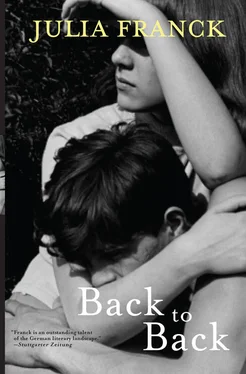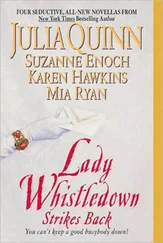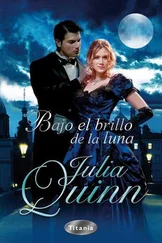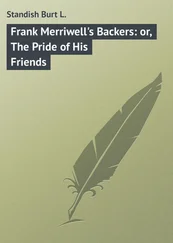Julia Franck - Back to Back
Здесь есть возможность читать онлайн «Julia Franck - Back to Back» весь текст электронной книги совершенно бесплатно (целиком полную версию без сокращений). В некоторых случаях можно слушать аудио, скачать через торрент в формате fb2 и присутствует краткое содержание. Год выпуска: 2013, Издательство: Grove Press, Жанр: Современная проза, на английском языке. Описание произведения, (предисловие) а так же отзывы посетителей доступны на портале библиотеки ЛибКат.
- Название:Back to Back
- Автор:
- Издательство:Grove Press
- Жанр:
- Год:2013
- ISBN:нет данных
- Рейтинг книги:3 / 5. Голосов: 1
-
Избранное:Добавить в избранное
- Отзывы:
-
Ваша оценка:
- 60
- 1
- 2
- 3
- 4
- 5
Back to Back: краткое содержание, описание и аннотация
Предлагаем к чтению аннотацию, описание, краткое содержание или предисловие (зависит от того, что написал сам автор книги «Back to Back»). Если вы не нашли необходимую информацию о книге — напишите в комментариях, мы постараемся отыскать её.
, was an international phenomenon, selling 850,000 copies in Germany alone and being published in thirty-five countries. Her newest work,
echoes the themes of
, telling a moving personal story set against the tragedies of twentieth-century Germany.
Back to Back Heartbreaking and shocking,
is a dark fairytale of East Germany, the story of a single family tragedy that reflects the greater tragedies of totalitarianism.
Back to Back — читать онлайн бесплатно полную книгу (весь текст) целиком
Ниже представлен текст книги, разбитый по страницам. Система сохранения места последней прочитанной страницы, позволяет с удобством читать онлайн бесплатно книгу «Back to Back», без необходимости каждый раз заново искать на чём Вы остановились. Поставьте закладку, и сможете в любой момент перейти на страницу, на которой закончили чтение.
Интервал:
Закладка:
His body hair was still sparse, his chest smooth, nothing but blond down growing in his armpits and on his upper lip, and you could easily see not only his armpits but his testicles as well. Thomas crossed his arms over his chest, rubbing his skin to warm it up until it showed red weals.
Käthe looked him up and down. Weedy for a model, aren’t you? Don’t quite make the grade. She stubbed her cigarette out. Don’t make such a fuss about it, she said. A boy who lounges around his room all day writing poetry ought to go swimming now and then, run in the woods. It’s all on your doorstep. A lad like you needs fresh air or you’ll waste away. Käthe took several steps towards him. Put your arm up in the air. She showed him the angle she wanted. He knew it already, he’d been holding it at that angle for many days, hand behind his head; he had stamina, Käthe valued that in him. And he cost her nothing. Now, move your right leg slightly forward. There, that’s it. Käthe took another step towards him. Thomas could smell the garlic on her breath.
He was good at standing still; for several years he had been sitting for Käthe as a model, not to mention standing and lying down for her. It made sense, it was only natural, since after all they were living under the same roof, and he had some years to go yet before his school-leaving exam. Weedy was a nasty description, Thomas squirmed when he heard it, nor did he like to be told he didn’t make the grade, but he didn’t want to show that she had hurt his feelings. In her mouth those didn’t sound like mere insults. Käthe was describing the kind of person who, in her eyes, was an inadequate and lesser being. She would never say such things to one of the sculptors or writers she revered, nor to any woman friend of hers. They were reserved for inferior creatures, for Thomas, for children, for subservient models. She could speak to Ella in a way that demeaned her too. Käthe walked across the big room to her radio, which stood on a low bookshelf, covered with dust like everything else in the studio, and searched for a station broadcasting music. She loved Brahms and Vivaldi, Handel and Shostakovich, music for strings, powerful Romantic concertos full of universality and emotion, melancholy and cheerfulness. Up in the smoking room Käthe had had a record player for some time, but the records and needle were too sensitive to stone dust, so as she worked she had to listen to whatever was being played on the radio. If she couldn’t find any classical music, she listened to the discussion programmes. She was lucky today; the familiar female voice announced the string quartet no. 2 in A minor, op. 51, by Brahms. A Romantic start to the day’s work. She put on her protective goggles and took a few steps round the block of stone on which she had been working for three weeks, assessing it. Thomas thought he could sense her impatience. Käthe was breathing fast enough to make her big breasts heave. Her eye held the keen glance of an eagle about to discover and perceive the potential of every moment: she was already chipping away at the stone. Thomas sensed her hope, which to his mind had something childish about it. Käthe believed, defiantly and to some extent arbitrarily, that her creative work would succeed. He admired her for her lack of doubts; he himself had doubts at every moment of his life, and even deciding whether to buy potatoes and carrots or cabbage and meat when he went shopping cost him a great effort. Maybe he just didn’t have much taste? Thomas thought of cherries and how much he liked the taste of those, so much so that they gave him a stomach ache every summer. But shopping called for more than taste; it meant weighing up the preferences of other people who would be sitting at the same table with you, eating the meal.
Käthe seemed as certain of her taste as she was of her ability. You could already see, in broad outline, the head of the sculptured figure and the arms, which were bent level with each other. They had a pale, warm glow, their sandy yellow and earthy ochre made the human form appear inviolable. The body and legs were still hidden in the block of sandstone quarried from the Elbe area. The lower part of the stone was almost black; if sandstone was left out in the open for a long time it darkened. Greenish shadows made you think of lichen, moss or mould. Käthe’s stone had drawings in oil pastel on its surface, where she wanted to show the stonemason the places to chip away superfluous material in line with her sketches and models. Thomas knew how much Käthe loved the stones; he knew the look in her eyes as she tested a stone’s qualities, how she would strike one and make her assessment of its content of iron oxide and quartz. She liked sandstone from the Elbe. It had strangely dark veining, it was soft enough for her to work at it for hours on end, and so firm and resistant to damage that it stood a good chance of keeping the shape she gave it for centuries, even millennia. There was something monotonous about her tapping at the stone, something that radiated calm, and did not just demand patience but engendered it, at least for Thomas.
Not all decisions were difficult for him. He thought of the swallow that he had found last summer in the yard outside the door of the studio. Swallows nested under the roof; they had built their round nests below the gutter and fed their young there without a pause. At first he had thought the swallow was dead. He knelt down beside it and saw the blue-black sheen of its feathers, the brownish black of its forked tail, the crossed wing tips; its breast was bright white. It lay motionless on its back, its eyes looking as if they were blind. He carefully picked the little bird up. A slight movement of its plumage made him think of the wind; he blew on it, but it did not move. Its light body was faintly warm. Next moment he saw its ribcage rise — it was still breathing — and fall again. Thomas felt tears in his eyes. He stroked the little head with his forefinger. Did small birds like this fracture their skulls? His eyes went to the nests, and he clearly heard the young chirping. The sky and the tops of maple trees were reflected in the upper windows of the studio. It must have flown into one of the windows. How smooth the down of its head was. It neither moved its head nor spread its wings by a single millimetre; it must have severe internal injuries. Its soft feathers ruffled up. Thomas put the bird down on a piece of wood and wondered how he could lay it down to die in peace, how and where he could bury it later. He heard the sound of an engine outside the gate. He didn’t want to be disturbed, he didn’t want company, he wanted to be alone with the swallow. He was going to stay with it and protect it by his presence, so that the cat wouldn’t come along and eat it before it was dead and he could bury it. Suddenly its feathers moved. It flew up. Thomas jumped; maybe he had cried out in alarm. The swallow must have come back to life faster than he could watch it; it had dived off his hand, flew low close to the ground and then soared into the air, up and over to the workshops on the property next door.
The swallows were in the south now, the puddles in the yard were frozen, for the last few days it had been possible to walk on the ice of the reservoir in the woods with slide shoes. Thomas didn’t have any; his feet had grown much larger in the last two years. So over the past few days he had tried to make some out of the brass he normally used to make bracelets and rings. But it was too soft; after his first attempt yesterday deep notches had shown in the soles; the alloy was not stable, and thus not smooth enough for going on the ice. He had promised to give Ella a pair of slide shoes, he just needed a little more money, so it was not surprising that Käthe’s purse caught his eye, a small black-and-white object with a catch on top to open it. It was lying on the radio set. Käthe briefly interrupted her work to switch on the standard lamp in the corner; its three necks with the tulip-shaped lights on them could be turned to shine on the high ceiling, or on the floor that reflected the light — in that position they also lit up her model — or turned on the block of stone. In spite of all the studio windows the natural light was getting fainter and fainter; the sun had disappeared long ago. At this time of year it was bright enough to work without artificial light only for three or four hours a day. A daddy-long-legs was making its way down from the windowsill; it stalked over to a weary fly and set to work on it.
Читать дальшеИнтервал:
Закладка:
Похожие книги на «Back to Back»
Представляем Вашему вниманию похожие книги на «Back to Back» списком для выбора. Мы отобрали схожую по названию и смыслу литературу в надежде предоставить читателям больше вариантов отыскать новые, интересные, ещё непрочитанные произведения.
Обсуждение, отзывы о книге «Back to Back» и просто собственные мнения читателей. Оставьте ваши комментарии, напишите, что Вы думаете о произведении, его смысле или главных героях. Укажите что конкретно понравилось, а что нет, и почему Вы так считаете.












